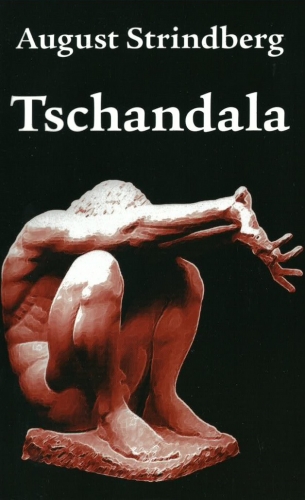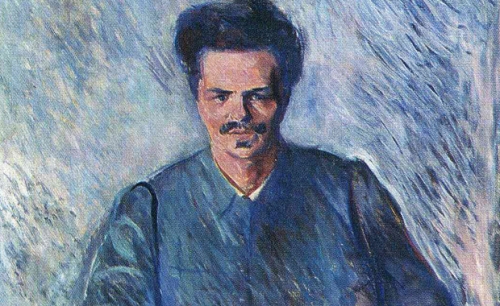Although best known as a playwright, the Swedish author August Strindberg (1849–1912) was a prolific writer of novels, short stories, poetry, and essays. The official edition of his collected works comes to more than seventy volumes. In 1888 Strindberg attended a series of lectures about the then little-known philosophy of Friedrich Nietzsche. He quickly became a devotee of Nietzsche and even started up a brief correspondence with the philosopher. After reading Beyond Good and Evil, The Twilight of the Gods, The Case of Wagner, and On the Genealogy of Morals, Strindberg began to write works that were directly influenced by Nietzschean philosophy as well as social Darwinist thought. One of the most explicit examples of this is the novella Tschandala of 1889.
The novella is set in Lund, Sweden in the 1690s, which was in a province that had only been recently captured from the Danes. The protagonist is one Master Andreas Törner, a professor at the University of Lund and an army veteran who had participated in the battle in which the Swedes wrested control of Lund from the Danes. Unlike the situation today, the victorious Swedes realize that multiculturalism does not work, and they use the educational system to enforce the societal norms, language, and ethos of the dominant culture. In scenes reminiscent of a typical Chicago or Detroit public school, Strindberg even describes Törner needing to employ his walking stick as a cudgel against his more recalcitrant students. After a long academic year, Törner is looking forward to taking his wife and children to his home province for the summer. Just as the school year is about to end, Törner receives orders from the Swedish court that he must remain in the area and ingratiate himself with the local population as a means to determine the degree to which the process of integration with Sweden is succeeding.

Törner ends up renting rooms in a dilapidated estate from a demented Danish Baroness. The estate is run by the Baroness’ factor Jensen, who is a gypsy given to wearing outlandish and filthy clothes, lies almost constantly, treats animals in a most cruel fashion, does almost no work on the property, and who is also the Baroness’ lover. In the beginning, Jensen tries to ingratiate himself with Törner, but the gypsy’s monstrous behavior soon puts him at odds with Törner. In a moment of self-clarity, Törner realizes that just proximity to a person as vile as Jensen is debilitating:
When he [Törner] examined himself, he found he had adopted a number of the gipsy’s gestures, borrowed certain tones of voice and, even worse, mixed Danish words and expressions into his speech. He had been jabbering with these infantile people for so long that he was forgetting how to speak properly; he had been lowering himself to their level for so long that his back was becoming hunched; he had been hearing lies for so long that he had come to believe that everyone lied. And he, a strong man who had never been afraid of battle, noticed that his courage was beginning to desert him, that cowardice and fear were creeping up on him in this struggle against invisible powers and enemies who were superior because they did not shrink from using weapons he could not bring himself to employ.
Herein lies Törner’s dilemma: the civilized man has difficulty accepting the fact that the uncivilized play by a different set of rules, that etiquette, good form, fairness, and tolerance are actually weaknesses when confronted by barbarism. As the novella’s narrator states:
What, then, lay at the heart of Törner’s disquiet about crushing this opponent? It was his sense of the value of human life, the doctrine that we should forgive our enemies, defeated or not. Old and foolish teachings which malevolent men have always availed themselves of to overthrow those who have been merciful in victory; stories of the blessings of compassion—omitting, of course, the story of the frozen serpent which turned on the breast that warmed it.
After a visit from a friend who—when hearing of Törner’s conflict with the gypsy—advises Törner to take more drastic measures with Jensen, Törner begins to plot the gypsy’s downfall. Using his superior intellectual abilities and in a manner in which to bring no suspicion upon himself, Törner is able to manipulate Jensen into a very macabre end, which I will not reveal so as not to spoil the delight of readers at witnessing the just desserts of such a reprehensible creature. The narrator states:
The pariah was dead, the Aryan victorious. Victorious thanks to his knowledge and spiritual superiority to the inferior race. But had he not found the strength to commit a crime he could easily have been the victim.
Back at the University, Törner comes across a Hindu text that describes the Tschandala, the lowest substratum of the untouchable class, a race of humiliated persons who are denied permanent abodes, must wear only clothes taken from corpses, and may not wash since they are only allowed water to drink. He realizes that Jensen was a Tschandala and that the hatred that Jensen displayed toward him—who had only shown the gypsy good will—was inevitable, a hatred born of genetics, “the fruit of adultery, incest, and crime.”
Not surprisingly, Tschandala is not easily obtainable in English. The translation I have is by Peter Graves and was published in 2007 by Norvik Press in Norwich, UK. Copies can be found, however, on Amazon and a Swedish version is available on Gutenberg.com





 del.icio.us
del.icio.us
 Digg
Digg
Les commentaires sont fermés.